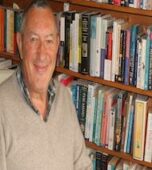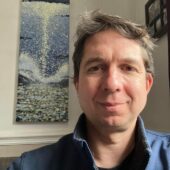
Therapists in Wigston Magna, England ENG, United Kingdom GB

Mr Jay Pink
Therapist, Ad.Prof.Dip. PC MNCS Acc
Getting you back to good…
In everyday life, we all suffer from anxieties or concerns that may limit our happiness. Therapy involves coming to terms, and understanding reasons you may be unhappy or struggling with things. You deserve to live the life you want, to feel good.
John Castleford
Registered Psychotherapist, MA, mARCHTI
Many therapists focus on what is "wrong" and use 'referring issues' as the starting point. However, current best practice strongly suggests that personal introspection, guided or not, tends to keep the pain of the past very much in the present. If you want to focus on what is adversely affecting you, what better way to keep the brain tuned in to it is staying focused on it. I base my approaches on the very latest findings from neuroscience, and my starting point is often the time when you were at your best, and experiencing high points in your life: by recalling those we not bring great memories into our present focus but we also recreate those wonderful feelings we felt at that time. So, just as you do your best work when you are at the top of your game, focusing on positive rather than negative feelings from the past is a great place to begin work. Just ask yourself if you make your best decisions when you are feeling low. Now compare that to when you have been so buoyed up that you feel all but unstoppable.
Most people aren't 'broken'. But they may be side-lined or undermined. Or held back, Stuck, or otherwise constrained by a mismatch between expectations/aspirations and how you feel. The logical bits of the brain don't always align with emotions and feelings.
Maybe external circumstances have contributed to persistent low mood. Perhaps your self-esteem took a nose-dive, or you find it hard to cope, or don't feel you're in control anymore.
Our thoughts often control us, and our feelings -- and our behaviour often depends on how we feel. So do our thoughts and the associated feelings prevent us from becoming the best version of who we could (and should) be? Are your thoughts stopping you from being the best version of who you could be? I suspect it probably wasn't always like this. I
f I can't make you feel better about yourself within 15 minutes then I don't deserve to work with you.
Why not let me use my academic background (degrees in anthropology, and a degree in education) as well as decades of experience in psychological support, coaching, education, and psychotherapy to help you?
As well as general issues, such as low mood, phobias and traumatic experiences, I also specialise in existential therapy and have an extensive background in the philosophy of Stoicism [not the unemotional/stiff-upper-lip Mr Spock version] on which Albert Ellis' REBT and Aaron Beck's CBT both based their therapeutic approaches.
I draw on a broad background in academia, teaching (secondary and higher education), anthropology, philosophy, neurology and psychology which I update continuously. I suspect Neurology and Psychology are boring through the proverbial mountain towards each other but they are still some distance apart. So insights from both are useful. I feel the therapeutic professions tend to over-label conditions too readily and that often means their clients identify with the label. I have a wide range of theoretical orientations and can utilize specialist modalities and interventions that are appropriate for the client. I list specialties below and also include testimonials that describe outcomes that speak more eloquently than any personal statement.
Jerry Ramsden
Counsellor/Therapist, (Dip.Couns)
My work is based on inner-child healing, goal setting, and building mental resilience, underpinned by science.
Audra McKellar
Counsellor/Therapist, MNCS (accred), Prof.Dip.Psy.C, SMACCPH
I am passionate about helping people overcome the barriers that are holding them back from thriving. I have trained and researched extensively to find the most effective ways of helping my clients explore their problems and the tools and strategies they need to move them forwards. Although the work is sometimes uncomfortable, there may well be some humour along the way...
Donna Collins
Registered Psychotherapist, BSc (hons), PGDip, SupervisionDip
Hello, I'm so pleased you were drawn to my profile. I provide both in-person and online therapy. I create a calm, healing space for clients to feel secure and trust in our therapeutic relationship so that they can explore their inner world. I am very experienced in helping clients transform and evolve through their difficult feelings to feeling confident and creative in however they choose to express themselves in the world.
I work very intuitively and align myself to each client's unique way of functioning. Through experienced means of deep listening and communication, I offer alternative ways of viewing the world, and help you to increase your awareness of yourself through cognitive and emotional exploration. I also help you to begin to notice the way you speak to yourself, facilitate atunement with your body, and apply other interventions that heighten your awareness and help you heal.





